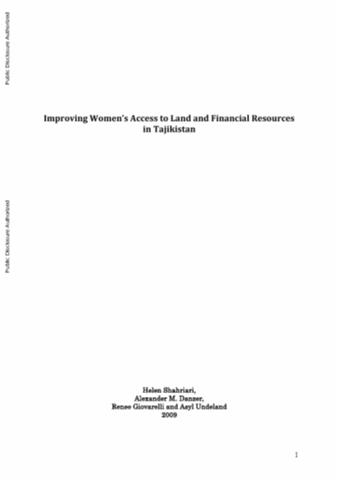Resource information
Since independence in 1991, the Government of Tajikistan has embarked on a land reform program, which includes extensive farm restructuring. Given the demography of rural households in Tajikistan where the phenomenon of female-headed households is quite significant, women ‘s access to land and credit assumes special importance. To date, however, no thorough gender analysis of access to land and finance in Tajikistan has been conducted. As a result, there is insufficient gender disaggregated data to inform policy. It is not clear how effective the reforms are in addressing factors inhibiting women ‘s access to land and their ability to benefit from any changes. In addition, due to the lack of data, no comprehensive microeconomic study on access to finance has been done. Many Tajik women are sole heads of households and caretakers of their families as a direct consequence of war and migration. Migration in particular has a great impact on gender relations, gender division of labor, and gender roles with the possible empowerment or disempowerment of women left behind. Households headed by women in Tajikistan are 28.6 percent more likely to be poorer than those headed by men. Improving and securing access to land and ensuring the gender sensitivity of land reforms, therefore, has potential for improving the conditions of these vulnerable households. The reports propose several areas of action. While fostering women ‘s access to agricultural production can be considered a policy for improving basic welfare, access to finance is an important ingredient for increased productivity and farm growth (i.e., professionalization and potentially commercialization). Financial access opens up opportunities to diversify income generation beyond farming activities. Complementary initiatives for women ‘s empowerment support their access to productive assets and entrepreneurial standing in society, and may simultaneously lift women ‘s self-constraints in demand for finance.


